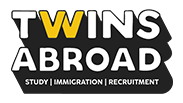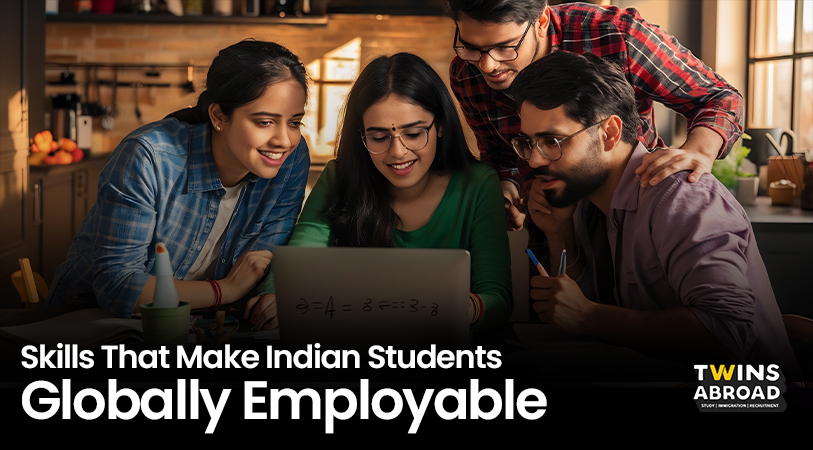Skills That Make Indian Students Globally Employable
In today’s interconnected world, the demand for a globally competent workforce is more pressing than ever. Indian students, with their rich academic backgrounds and diverse cultural experiences, are uniquely positioned to meet this demand. However, to truly thrive on the international stage, it’s essential to cultivate a blend of technical prowess and soft skills that align with global employer expectations. This blog delves into the key skills that enhance the global employability of Indian students, offering insights into how they can prepare for successful international careers.
1. Technical Proficiency in Emerging Technologies
The rapid advancement of technology has reshaped industries worldwide. Indian students aiming for global roles must stay abreast of these changes.
a. Artificial Intelligence (AI) and Machine Learning (ML)
AI and ML are revolutionizing sectors from healthcare to finance. Proficiency in these areas not only opens doors to cutting-edge roles but also demonstrates adaptability to future technological shifts. Students can gain expertise through online certifications, internships, or projects that involve real-world applications.
b. Data Analytics and Big Data
In an era where data drives decisions, understanding data analytics tools and methodologies is crucial. Skills in platforms like Python, R, SQL, and tools such as Tableau or Power BI can set candidates apart and equip them to contribute meaningfully to data-driven strategies.
c. Cybersecurity
With increasing digital threats, expertise in cybersecurity ensures the protection of organizational assets, making it a highly sought-after skill globally. A foundational understanding of network security, encryption, and ethical hacking can give students a competitive edge.
d. Cloud Computing and DevOps
As more companies migrate to cloud-based infrastructures, knowledge in platforms such as AWS, Azure, and Google Cloud, combined with DevOps practices, can vastly improve a student’s employability in IT and tech-driven roles.
2. Effective Communication Skills
Clear and concise communication is the cornerstone of global collaboration.
a. Proficiency in English
While many Indian students are fluent in English, refining pronunciation, expanding vocabulary, and understanding cultural nuances can enhance clarity and confidence. Participating in debate clubs, writing blogs, and taking communication courses can be great ways to polish these skills.
b. Active Listening
Being an effective communicator isn’t just about speaking; it’s equally about listening. Active listening fosters better understanding and collaboration. It helps in interpreting non-verbal cues and responding appropriately, especially in multicultural teams.
c. Cross-Cultural Communication
Understanding and respecting cultural differences in communication styles can prevent misunderstandings and build stronger international relationships. Exposure to diverse communities and international students during education can offer practical insights into navigating global interactions.
3. Critical Thinking and Problem-Solving Abilities
Employers worldwide value individuals who can navigate complex challenges with innovative solutions.
a. Analytical Reasoning
Breaking down complex problems into manageable parts and analyzing them systematically is a skill that transcends industries. Engaging in case studies, analytical games, and real-world problem-solving workshops can sharpen this capability.
b. Creativity and Innovation
Thinking outside the box and bringing fresh perspectives can drive progress and set candidates apart in competitive environments. Hackathons, innovation competitions, and brainstorming sessions are platforms where students can develop and showcase these abilities.
4. Adaptability and Resilience
The global job market is dynamic. The ability to adapt and bounce back from setbacks is invaluable.
a. Embracing Change
Being open to new methodologies, technologies, and environments showcases flexibility and a growth mindset. It reflects readiness to take on leadership roles that involve uncertainty.
b. Stress Management
Handling pressure with grace ensures consistent performance, even in challenging situations. Techniques such as mindfulness, time-blocking, and peer support groups are effective tools for maintaining mental well-being.
5. Leadership and Teamwork
Global roles often require collaboration across diverse teams.
a. Leading with Empathy
Understanding team members’ perspectives and needs fosters a supportive and productive environment. Emotional intelligence is a key leadership trait that helps build trust and morale.
b. Collaborative Mindset
Valuing collective success over individual accolades promotes unity and shared achievement. Participating in student clubs, project teams, and volunteer work helps develop a team-first attitude.
6. Cultural Intelligence
Navigating the global workplace requires sensitivity to cultural differences.
a. Awareness and Respect
Recognizing and respecting cultural norms and practices enhances interpersonal relationships and teamwork. Learning about global etiquette and working in multicultural groups builds this skill organically.
b. Continuous Learning
Being curious and open to learning about different cultures enriches personal and professional experiences. Exchange programs, language courses, and travel expand a student’s worldview.
7. Digital Literacy
In a digital age, proficiency with technology is non-negotiable.
a. Familiarity with Digital Tools
Understanding tools like Microsoft Office, Google Workspace, and project management software is essential. Familiarity with remote collaboration tools such as Zoom, Slack, and Trello is now a baseline requirement.
b. Online Etiquette
Maintaining professionalism in digital communications, from emails to virtual meetings, reflects well on one’s personal brand. This includes writing polite and clear emails, being punctual for virtual meetings, and maintaining eye contact through the camera.
8. Time Management and Organizational Skills
Efficiency and reliability are key in any role.
a. Prioritizing Tasks
Identifying urgent versus important tasks ensures timely and effective work. Creating to-do lists, using calendars, and blocking time for focused work can greatly improve productivity.
b. Goal Setting
Setting clear, achievable goals provides direction and motivation. Regular self-evaluation and progress tracking keep students on the path to success.
9. Continuous Learning and Self-Motivation
The commitment to personal growth is a trait admired globally.
a. Pursuing Further Education
Engaging in courses, certifications, or workshops demonstrates initiative and dedication. Platforms like Coursera, edX, and Udemy provide affordable access to globally recognized certifications.
b. Seeking Feedback
Actively seeking and applying feedback fosters continuous improvement. It shows humility and the desire to evolve professionally.
10. Ethical and Professional Integrity
Trustworthiness and ethical behavior are foundational to professional success.
a. Honesty and Transparency
Being truthful and transparent builds trust with colleagues and superiors. Adhering to codes of conduct and showing accountability in group settings reinforces a strong professional reputation.
b. Accountability
Taking responsibility for one’s actions, both successes and mistakes, reflects maturity and reliability. This is especially important when working remotely or with international teams.
11. Industry-Specific Competencies
Global employability often depends on specialized industry knowledge.
For instance, finance students may benefit from CFA or CPA certifications, while aspiring engineers should stay updated on developments in sustainable design or automation. Hospitality students should focus on global standards in service delivery, and media students need to understand international trends in digital storytelling.
12. Networking and Relationship Building
Who you know can often be as important as what you know.
Engaging with alumni, attending global conferences, participating in industry webinars, and being active on platforms like LinkedIn can open doors to internships and job opportunities. Networking also provides insights into regional job markets and hiring trends.
13. Internships and Global Exposure
Practical experience in an international setting helps Indian students adapt to different work cultures. Participating in international internships, part-time jobs, or research projects enhances a resume and showcases adaptability and hands-on experience.
14. Branding Yourself for a Global Audience
Students must learn to market themselves effectively. This includes creating an impressive LinkedIn profile, tailoring resumes for different countries, and mastering virtual interviews. A portfolio showcasing projects, research, and achievements adds credibility.
Conclusion
The global job market offers immense opportunities for Indian students equipped with the right blend of technical skills and soft competencies. By focusing on continuous learning, cultural adaptability, and personal development, Indian students can not only meet but exceed global employer expectations. Embracing these skills will not only enhance employability but also pave the way for fulfilling and impactful international careers. The journey to becoming globally employable is continuous, but with the right mindset and preparation, it is well within reach.


Leave a Reply